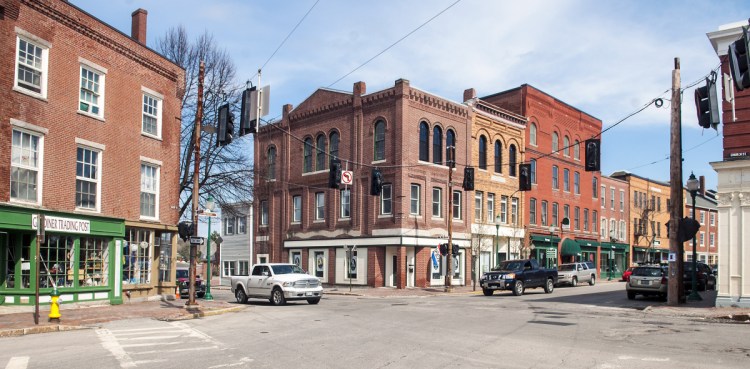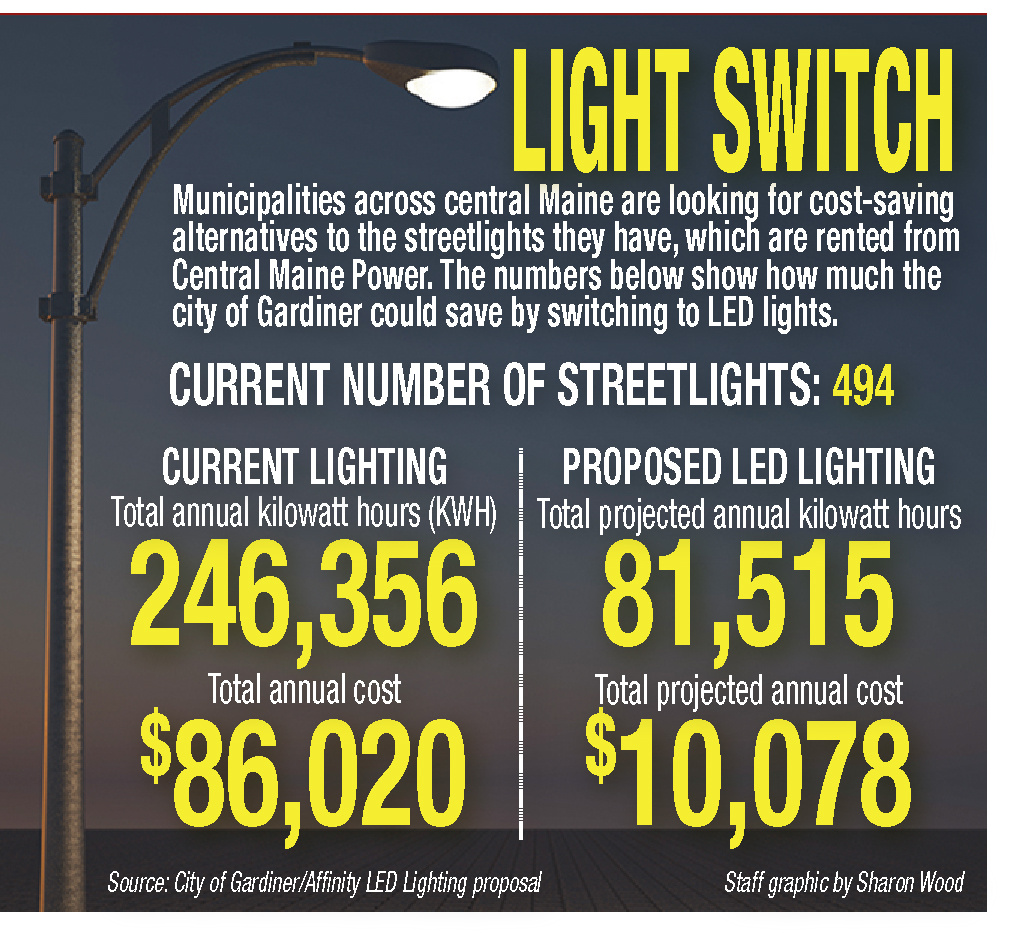GARDINER — As early as perhaps February, the traditional streetlights in Gardiner and surrounding towns could be swapped out for a version that uses less electricity, cuts down on light pollution and will take a smaller bite from municipal budgets.
Two companies have signaled interest in doing the work — Affinity LED Lighting of Dover, New Hampshire; and RealTerm Energy, with offices in Annapolis, Maryland, and Montreal.
Both companies are in the business of replacing the streetlights municipalities lease from their electric utility — in this area, it’s Central Maine Power Company — with fixtures that use light-emitting diode technology.
“Economically, it makes a lot of sense,” Gardiner Mayor Thom Harnett said.
Gardiner officials are now considering a proposal from Affinity LED that would replace the city’s 494 fixtures with LED versions equipped with smart technology that would allow them to be dimmed or brightened and would send status notifications.
To pay for it, they are considering issuing short-term bonds for about $294,000. The measure is scheduled for a public hearing and first reading at the Dec. 19 Gardiner City Council meeting. A second public hearing and final reading is scheduled for the Jan. 9, 2019, meeting.
In taking this path, Gardiner officials are following the path marked out by Augusta officials, who earlier this year sent out requests to identify a company to convert the lights in the state’s capital city and selected Affinity LED.
Christine Landes, Gardiner city manager, said other communities in the area have been invited to tag along at the same pricing.
Under Affinity LED’s proposal, using the LED fixtures is expected to cut the $86,020 that Gardiner pays annually for its lights to $10,078.
Steve Lieber, Affinity LED’s president, said before installation takes place, his company will complete a field audit to make sure all the lights have been inventoried and that it matches CMP’s inventory.
“There’s the pole and the mast arm that sticks out from the pole,” Lieber said. “The light is the cobra head. We’ll remove the cobra head and replace with an LED luminaire.”
Because the lights have been unmetered, Lieber said, municipalities are billed on the assumption of dark hours. In the future, bills will be based on actual electricity consumption. And since the lights come equipped with smart technology, the electric use can be controlled.
“The networked lighting allows for adjusting and being conscious of energy consumption,” Lieber said.
As demand for light changes throughout the day, the level of light can change as well, he said. A commuter corridor with high traffic in the early evening may require more light; when traffic dissipates later in the evening, the lights could be dimmed.
The system can also signal when a power surge or power drop has occurred.
And because of the construction of the light and its optics, the LED fixtures are Dark Sky compliant, which means that sky glow that exists over cities at night is reduced.
Scott Tilton, Chelsea town manager, said he’s been looking at street light conversions for several years.
“It’s been a long time to get the other towns to make a decision,” Tilton said.
In October, officials from Chelsea, Farmingdale, Vassalboro, Belgrade, Randolph, Pittston and Gardiner met in the Randolph Town Office to hear a presentation from officials from RealTerm.
Town officials say they have not yet seen a proposal from RealTerm, but they can see the benefits of conversion.
For Chelsea, with its 45 streetlights, the savings could amount to about $2,100 annually, which is about a third of its streetlight budget.
Across the Kennebec River in Hallowell, City Manager Nate Rudy said officials are waiting for information from CMP so an analysis can be completed.
In an email, Rudy wrote that CMP has been swamped with requests. When the information is returned, he said, he’ll forward it to the City Council’s Finance Committee for consideration.
Once the conversion is paid for, the city could save more than $1 million over the next two decades. That’s about 20 percent of the city’s annual spending plan.
Because the term of the bonds is four years, Gardiner would not see benefit from the conversion until the fifth year.
Landes said it’s too early to know how city officials would use the savings because priorities change from year to year, but it’s clear that they would be seeking that much less from taxpayers.
“It’s a generic number,” she said. “They can’t totally forecast it out. It’s a snapshot in time.”
It can’t take into consideration changes in CMPs rate structure, for instance.
The conversion to the LED fixtures offers opportunities other than savings.
Because Gardiner officials are expected to choose the networked lights, those lights will have the capability to support citywide internet at some point.
“What the technology brings, I don’t know,” Landes said. “The future is smart cities and reducing the carbon footprint.”
That’s not lost on Affinity LED, which hosts a running tally of money saved and carbon dioxide emissions reduced on its website.
The fixtures are assembled at its headquarters in Dover by veterans, and they are packed out to installation sites in reusable totes, eliminating the need for corrugated cardboard that ends up as solid waste in landfills.
“That’s definitely something we all need to be thinking about given the climate change report that just came out,” District 2 Gardiner City Councilor Pat Hart said. Hart will be sworn-in in January as Gardiner’s next mayor.
The Fourth National Climate Assessment, issued at the end of November, details the impacts and risks of climate change to the United States.
“This community has been bold enough to try things,” Hart said. “We have to keep the long-term costs and benefits in mind.”
Jessica Lowell — 621-5632
Twitter: @JLowellKJ
Send questions/comments to the editors.




Comments are no longer available on this story